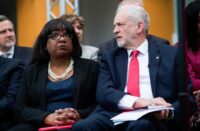The campaign for Irish reunification has apparently gained some new adherents. Leo Varadkar, the former leader of Fine Gael, has now emerged as a strong and vociferous advocate for this cause. Likewise with Colum Eastwood, ex-leader of the SDLP, who has invited Sinn Féin, no less, to participate in a joint campaign for unity.
Varadkar led the Blueshirts for seven years serving two terms as Taoiseach. In keeping with the long standing ethos and policy of that ultra conservative, right-wing party which he had joined as a teenager, Leo never used his powerful platform to question partition. Better known for his strong Thatcherite outlook epitomised by his infamous quip that he wanted a party “for people who get up early in the morning”. However, within six months of leaving office, he was speaking in favour of a united Ireland at a public function organised by Ireland’s Future in the United States.
So with Eastwood who served as party leader for nine years, yet at no stage did he use his position to move the SDLP towards adopting a firm stance on the national question. His New Ireland Commission was anodyne, putting emphasis on the contentious issue of reconciliation as a prerequisite to unity.
Since neither individual had a noticeable record of support for the crucially important constitutional reunification issue it begs the question, what are the implications of this somewhat odd intervention?
Undoubtedly, an end to partition is no longer as distant as it may once have seemed. Changing demographics and a dramatic shifting in terms of political representation in the six counties has created a situation that cannot be ignored, no matter how much authorities in Dublin and London wish it were otherwise.
Equally significant as the above is the current situation in the north in relation to the utter incompetence of the Stormont administration. A situation compounded by a structural stasis arising from the outworking of power-sharing in the devolved administration. Even casual observers of the six counties are aware of the ongoing failure to accomplish reasonable yet vital targets across all fields. A failure typified last month when yet again the A5 motorway was halted by farmers objecting to its potential detrimental impact on the climate. Meanwhile no mention of the proven disastrous impact of farm effluent on Lough Neagh or the toxic waste resulting from multi-nationals mining in the Sperrin mountains.
And all the while there is a growing realisation that London is indifferent to the needs of the six counties and its people, if only because the north’s 18 MPs carry no weight against English political considerations. Priority for the large parties in Westminster is now directed towards their home constituencies as the British economy continues on a downward spiral.
When these various factors are taken into account, it means that sooner or later a referendum becomes inevitable, and the outcome of that will most likely be bleak for the union with Britain.
So what role is there for Varadkar et al in such a scenario?
Evidence of this is already emerging. Last month Varadkar addressed a meeting in West Belfast attended by Gerry Adams. During the course of the event, the former Taoiseach insisted that fifty plus one percent in favour of unity in a referendum would be sufficient to remove the border. Moreover he also said that while reconciliation should be welcomed, its total effecting cannot be a precondition to unity. Tough talking indeed.
Meanwhile Colum Eastwood has flagged up his belief in a one Ireland approach by indicating his interest in contesting the upcoming presidential election in the 26-counties. Interestingly, Varadkar is reported saying that the SDLP man is well qualified for the position.
All well and good but it doesn’t require much imagination to predict how this process will develop if allowed to proceed without intervention from the left. After decades confined by the Irish ruling class to the political periphery, the endorsement of reunification by high profile establishment figures will be welcomed by many republicans. In order to maintain the broadest possible support, the objective will become the ending of partition without any definition of the social and economic make-up of the new Ireland.
While it is a mistake to over emphasise the role of the two individuals mentioned above, their engagement with the drive for reunification comes at a price. There can be little doubt that in order to maintain a consensus there will be no criticism of the free market or indeed its global anchors in Brussels and Washington. And as with playing truant during the recent Offences Against the State Act debate, a blind eye will be turned towards the ongoing engagement with the NATO machine. Needless to say, any talk of socialism will be taboo.
If we are to see a meaningful improvement in the working class’ living standard in terms of housing, health, education and employment not to mention safety from imperial wars, it is imperative that socialism is on the agenda and on the agenda now. Waiting or hoping to do so post-reuinification shall again leave us with the never never of a “stepping stones to the republic” situation.
We’re out for a workers’ republic and to hell with a new Free State, whatever it may be called.






